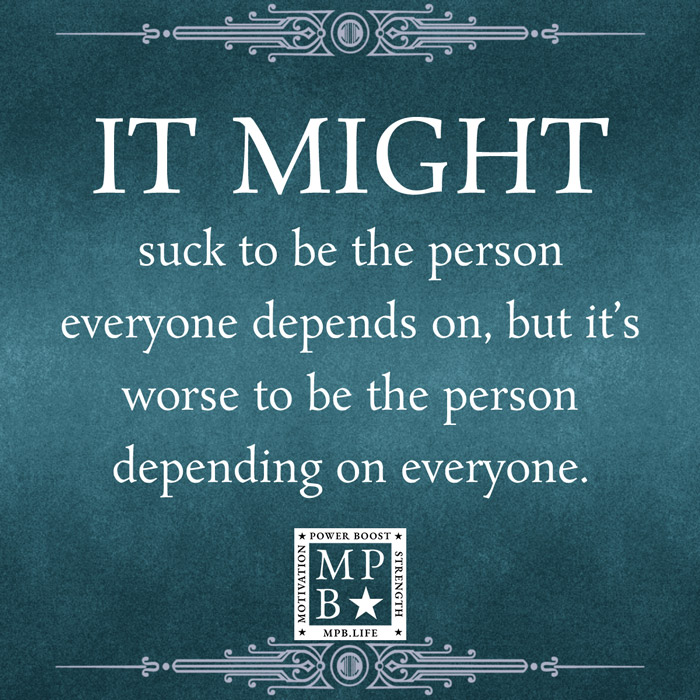
It Might Suck To Be The Person Everyone Depends On Graphic © motivationpowerboost.com
It might suck to be the
person everyone depends on, but it’s
worse to be the person
depending on everyone.
The Strength of Self-Reliance
In the journey of life, we often find ourselves in roles that demand much from us. Being the person everyone depends on can be a daunting and sometimes overwhelming experience. It’s easy to feel burdened by the weight of responsibility and the constant need to be a pillar of strength for others. However, as challenging as this role may be, it is ultimately a testament to your resilience, capability, and inner fortitude.
Consider the alternative: being the person who constantly relies on others for support, guidance, and direction. While there is no shame in seeking help when needed, a life spent perpetually dependent on others can lead to a sense of helplessness and a lack of personal growth. When we consistently lean on others to solve our problems and navigate life’s challenges, we rob ourselves of the opportunity to develop the skills and confidence necessary to stand on our own two feet.
Being the person everyone depends on, on the other hand, pushes us to rise to the occasion. It forces us to tap into our inner reserves of strength, creativity, and problem-solving abilities. Through this process, we discover just how capable we truly are. We learn to trust our instincts, make difficult decisions, and lead by example. These are invaluable skills that not only benefit us but also inspire and empower those around us.
Moreover, being depended upon is a reflection of the trust and respect others have for you. It means that people recognize your abilities, your reliability, and your unwavering commitment to their well-being. This is a tremendous honor and a testament to your character. Embrace this role with pride, knowing that you are making a positive difference in the lives of those who rely on you.
Of course, it’s essential to remember that even the strongest among us need support from time to time. Being depended upon doesn’t mean you have to shoulder every burden alone. It’s okay to reach out for help when you need it, to lean on your own support system, and to practice self-care. By taking care of yourself, you ensure that you can continue to be a source of strength for others.
In the end, being the person everyone depends on is a challenge, but it is also an opportunity for personal growth, leadership, and making a meaningful impact on the lives of others. Embrace this role with courage, compassion, and the knowledge that you have the strength within you to rise to the occasion. Remember, it is through the challenges we face that we discover our true potential and become the best versions of ourselves.
Fostering Resilience: Turning Challenges into Growth Opportunities
When faced with the weight of being depended upon, it’s natural to feel a sense of pressure and even doubt. However, these moments present a valuable opportunity to cultivate resilience – the ability to bounce back from adversity and emerge stronger than before.
Resilience is a skill that can be developed and strengthened over time. Every challenge we encounter, every obstacle we overcome, contributes to building our mental fortitude and emotional stamina. By learning to navigate difficult situations with grace and perseverance, we equip ourselves with the tools to tackle future challenges more effectively.
One key aspect of resilience is developing a growth mindset. Instead of viewing setbacks as failures, we can choose to perceive them as learning experiences. When we approach challenges with an open and curious mindset, we become more receptive to lessons and insights that can propel us forward. This mindset allows us to adapt, evolve, and continuously improve, rather than stagnating in the face of adversity.
Another crucial element of resilience is the ability to manage stress and maintain emotional balance. Being depended upon can be mentally and emotionally taxing, and it’s essential to have coping mechanisms in place to prevent burnout. This may involve practices such as regular exercise, mindful breathing techniques, or seeking support from loved ones or professionals. By prioritizing self-care and maintaining a healthy work-life balance, we can ensure that we have the energy and clarity to navigate challenging situations effectively.
Moreover, developing a strong support system is invaluable for fostering resilience. Surrounding ourselves with individuals who uplift and encourage us can provide a much-needed boost during trying times. These connections can offer valuable perspectives, practical assistance, and emotional support, reminding us that we are not alone in our struggles.
Ultimately, the challenges we face as the person everyone depends on are not obstacles to be feared, but rather opportunities for personal growth and the development of resilience. By embracing these challenges with a growth mindset, effective stress management strategies, and a robust support system, we can transform adversity into a catalyst for self-discovery, strength, and lasting success.
Related Inspirational Quotes
“It is better to depend on oneself than on others.” – Lao Tzu
“Self-reliance is the only road to true freedom, and being one’s own person is its highest reward.” – Patricia Sampson
“Lean on the self and you lean on a rock; lean on others, and you lean on a reed.” – John Shebbeare
“What lies behind us and what lies before us are tiny matters compared to what lies within us.” – Ralph Waldo Emerson
“Once we depend on the world, we are dependent.” – Anon.
